On Thursday 9th August, Jonathan, Claire and Catie visited the Wiener Library for the Study of the Holocaust & Genocide in Russell Square. The library provides an incredibly important and invaluable source of primary historical documents as well as an actively functioning library for research.
Catie
Head of Collections, Greg Toth, estimated that the Wiener Library has:
- 65,000 books in their document store (archive) and 5,500 books in their Reading Room (which seats 12).
- 45,000 photos
- 1,400 family manuscripts
- 3,500 dissertations
- 45,000 Nazi pamphlets
Many of these materials were gathered from 1925 by Dr. Albert Wiener and have not yet been catalogued. Most of the collection has not yet been digitised, although some of it has been microfilmed. An independent research library, un-supported by funds from the British government or Jewish organisations, the library relies mostly on donations from the public. While this independence allows the Wiener Trust to make decisions free from the strategic goals of larger organisations, it also limits the library in its ability to preserve and make accessible this incredibly important collection.
Claire
Started in Germany in the 1920s and officially established in Amsterdam in 1933, the collection was brought to London in 1938 where it has since remained. Originally settled in Marylebone, it moved to Russell Square in 2011. One of the houses dominated by the imposing height of Senate House was specifically refurbished to accommodate the Library. Having moved to Bloomsbury and become a neighbour of the University of London, the Wiener Library started a programme to improve access to its collections and widen their audience.
There are now exhibitions and displays showcasing items from the collections in all the public rooms. The Library runs a programme of events that regularly gather members of the public for book talks and conferences. It can easily be accessed by buzzing in and presenting proof of identity and address. It has been successful in drawing the attention of the second generation of Holocaust survivors, who want to discover the past that their parents have often hidden from them out of a desire to forget the horrors they went through.
However it does struggle to adapt to this new strategy. The premises are quite small: the reading rooms can only accommodate a limited number of users at the same time, while the stores in the basement are a series of very small rooms that do not allow simultaneous fetches. Only a very small portion of the archive collections is catalogued, which means most of them cannot be used. Increasing numbers of users from the neighbouring University of London also come with expectations that were not so far covered by the Library rules, such as the need for hot drinks in the reading room.
The 85-year-old Library is therefore trying to find its way forward in a changing context, and it will be interesting to see what the future holds for this remarkable institution.
Jonathan
I was surprised by my emotional reaction to this library, both upset and fascination.
You wouldn’t know it was there if you walked past it. It is open to all and it is a gold mine for research. It houses documents from late 19th century to today, including a signed English copy of Hitler’s Mein Kampf, which I refused to touch. It collects, amongst others, current far right journals from Germany. Bureaucracy in Germany means these journals are not censored.
One of the visitors commented that the collection could perhaps be more balanced with more left sided politics’ resources. Interestingly, it is not connected to any universities, meaning that most of its funding comes from donations. Sadly, this makes its future uncertain.
A wonderful and unique resource centre.
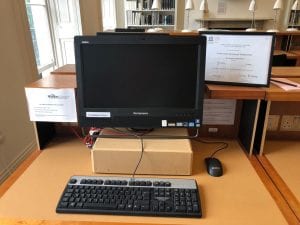
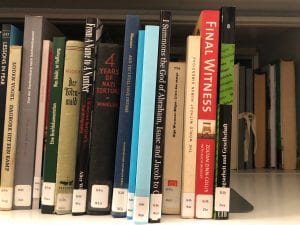
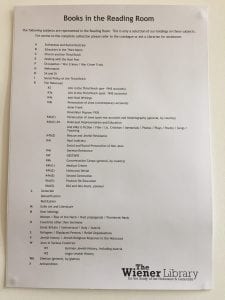
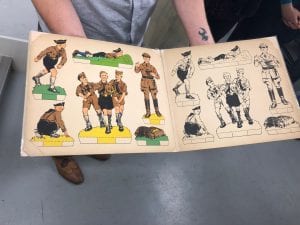



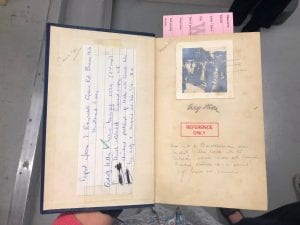


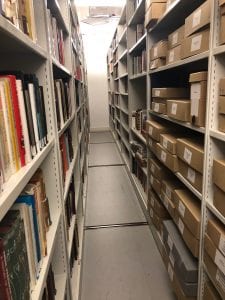

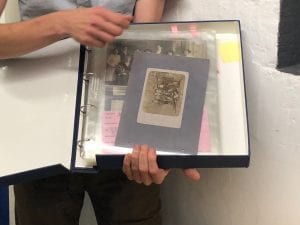
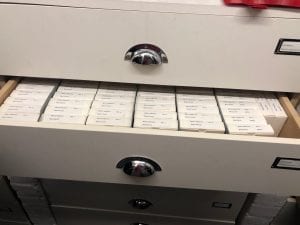

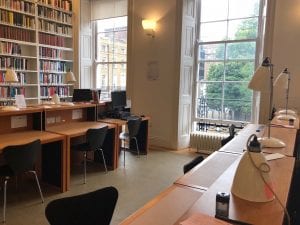
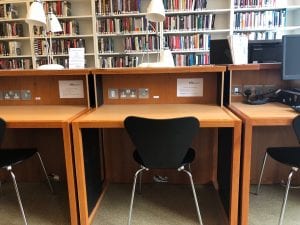
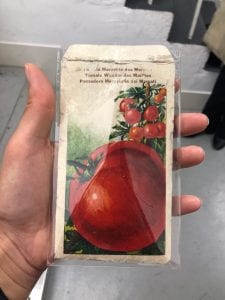
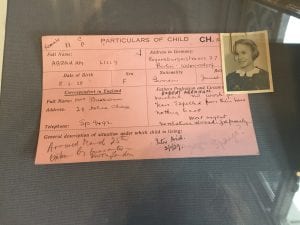
I highly recommend visiting this Museum. It’s true that you can barely notice it and it looks just like any other building. For your info the museum is opposite a taxi hut in the middle of the road if you’re looking towards and between Senate House and SOAS.
I saw an exhibition about medical experiments carried out on Jewish prisoners. A very sad viewing, very touching. The history documented by the Weiner museum will leave you with all the big questions about life and the pointlessness of war. It is a truly humbling experience.
I think it is an important place to visit, from this post I would be interested in visiting again and taking a look at some of the propaganda the Weiner library houses.